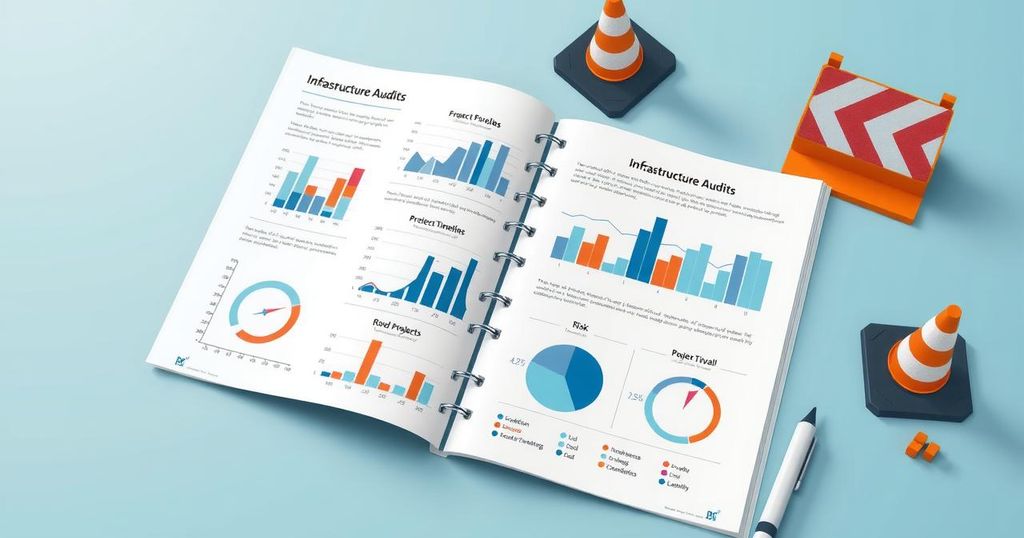The recent CAG audit has unveiled significant financial and operational issues within Tanzania’s infrastructure projects, encompassing losses from fraudulent contracts, delayed government funding, and inadequate weighbridge operations. Key findings include the termination of a Sh38.36 billion contract due to fraud and a Sh1 trillion shortfall in Tanroads’ budget, necessitating urgent reforms to address these systemic failures and protect public funds.
A recent audit conducted by the Controller and Auditor General (CAG) has revealed severe financial and operational deficiencies within Tanzania’s infrastructure sector, particularly in regard to road projects. The report highlights major losses due to contract terminations resulting from fraudulent activities, escalated project costs linked to funding delays, and increased risks of road damage stemming from inadequacies in weighbridge operations. These findings are part of the Annual General Report on the audit of the central government for the financial year 2023/2024, focusing on key agencies within the Ministry of Works, such as Tanroads, TBA, and Temesa.
The audit has identified considerable loss risks associated with the Ibanda-Kiwira Port trunk road project. A contract valued at Sh38.36 billion, awarded in December 2022, was terminated in May 2024 due to the contractor presenting forged documentation, including a counterfeit power of attorney and board resolution. Despite an initial advance payment of Sh3.72 billion, only a mere 2.27 percent of the project was completed by April 2024. Tanroads is currently pursuing recovery of Sh13.72 billion, but the associated Azerbaijani bank is under receivership, complicating the recovery efforts.
The report further details extensive delays in the Ruangwa–Nanganga Road project, primarily caused by late disbursement of government funds, which increased the project value from Sh50.34 billion to Sh52.13 billion. The contractor has submitted a compensation claim of Sh1.79 billion, which Tanroads has yet to contest. The CAG emphasizes that such financial setbacks could have been prevented with improved planning and timely funding.
The state of weighbridge operations remains troubling, as over 26,000 vehicles evaded weighbridges due to equipment malfunctions, power outages, or calibration issues. Notable instances include 22,928 vehicles at Mtukula and 1,652 at Makuyuni. The CAG warns that these lapses substantially elevate the risk of road damage from overloaded vehicles and advocates for improved maintenance protocols.
Weaknesses identified in the Special Load Permit System resulted in 792 instances of duplicate permit verifications, potentially causing a revenue loss of Sh41.18 million. The CAG advises that system enhancements and real-time monitoring are crucial to mitigate exploitation. Additionally, ongoing disputes between Tanroads and IT service providers regarding data access from 10 key weighbridges have impeded enforcement of overload regulations since January 2024.
Tanroads is grappling with a budget shortfall exceeding Sh1 trillion for fiscal year 2023/24, as only 52 percent of its maintenance budget was disbursed. This financial constraint has led to the suspension or abandonment of road projects valued at Sh495.24 billion and has resulted in a rise in interest on unpaid contractor claims to Sh38.75 billion. The CAG recommends that the government avoid initiating new projects until adequate funding for existing projects is secured.
Moreover, the allocation for supervision projects was only partially delivered. Of the Sh22.18 billion earmarked, merely 48 percent was disbursed, affecting oversight on 44 contracts and leading to enduring issues like potholes and drainage failures. Limited use of a Sh1.3 billion road doctor survey van resulted in only one of eight sectors being evaluated in 2023/24, which poses risks for maintenance planning and fund allocation.
Despite increased revenue generated from fuel levies, the road maintenance budget has remained stagnant since 2021/22 at Sh856.79 billion, with only 47 percent released in the current fiscal cycle. The CAG urges both the Ministry of Finance and the Road Fund Board (RFB) to seek new revenue sources to address the growing financial gap.
Further, notable collections at the Bunju Housing Project reveal that 39 public servants owe Sh3.98 billion, with TBA failing to enforce collection or penalties. In the Magomeni Housing Project, affordability issues led to only 173 out of 644 residents formalizing purchase agreements, delaying returns on a Sh50.19 billion investment.
Moreover, the CAG has identified that 32 vessels operated by Temesa lacked Certificates of seaworthiness due to legal uncertainties surrounding third-party insurance requirements. Conversely, despite exemptions for governmental vessels, Tasac continues to insist on insurance for certificate issuance, thereby jeopardizing passenger safety. The construction of a new ferry for the Mafia–Nyamisati route is also significantly behind schedule and is only 36 percent complete, attributed to poor contractor performance and logistical challenges.
In summary, the CAG’s report spotlights the immediate need for comprehensive reforms to safeguard public funds, enhance service delivery, and ensure the durability of infrastructure investments in Tanzania.
In conclusion, the Controller and Auditor General’s report reveals alarming deficiencies in Tanzania’s infrastructure sector, where financial mismanagement and operational inefficiencies are prevalent. Recommendations for systemic reform include improved supervision, timely funding for projects, effective debt recovery mechanisms, and enhanced operational protocols for weighbridges. The findings serve as a clarion call for heightened accountability and strategic financial planning to support sustainable infrastructure development in Tanzania.
Original Source: www.thecitizen.co.tz




